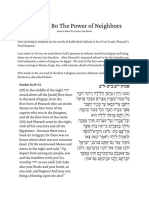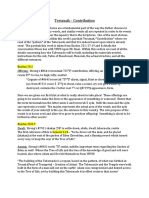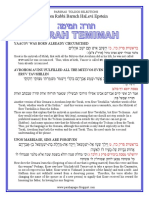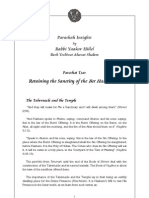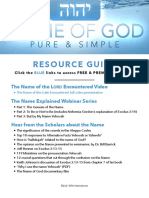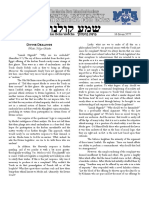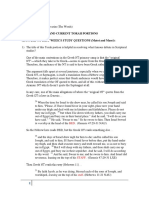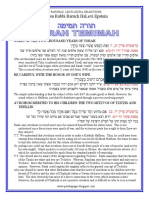H Y T U M: Hebrew Streams
H Y T U M: Hebrew Streams
Uploaded by
DUPLEX PRINT BOOKSCopyright:
Available Formats
H Y T U M: Hebrew Streams
H Y T U M: Hebrew Streams
Uploaded by
DUPLEX PRINT BOOKSOriginal Title
Copyright
Available Formats
Share this document
Did you find this document useful?
Is this content inappropriate?
Copyright:
Available Formats
H Y T U M: Hebrew Streams
H Y T U M: Hebrew Streams
Uploaded by
DUPLEX PRINT BOOKSCopyright:
Available Formats
Hebrew Streams
hebrew-streams.org
H A Y ACHID T HE U NIQUE M ESSIAH
Take now your son, your one and only son, whom you love.
(Genesis 22:2)
God has sent his one and only Son into the world,
that we might have life through him.
(1 John 4:9)
by Paul Sumner
saac and Yeshua are both called the one and only sons of their fathers. Isaac is
Abrahams yachid. Yeshua is Gods monogenes (Greek). Both words mean unique.
The link between the Hebrew Bible and the Greek New Testament is the Greek
Bible, the Septuagint, a translation done by Jewish scholars living in Egypt before the
time of Yeshua. [See Endnote]
The word yachid occurs 12x in the Hebrew Bible. This table lists how the Septuagint
renders yachid.
Hebrew
Yachid
Genesis 22:2
your one and only son (Isaac)
Greek
Septuagint / LXX
a)gaphto&j
loved one
agapetos
Genesis 22:12
your one and only son (Isaac)
a)gaphto&j
loved one
agapetos
Genesis 22:16
your one and only son (Isaac)
a)gaphto&j
loved one
agapetos
Judges 11:34
She was his one and only daughter
[ yechidah, fem.]
Jeremiah 6:26 Mourn as for an only son
monogenh&j
only, unique
monogenes
a)gaphto&j
loved one
agapetos
Amos 8:10
a time of mourning for an only son
a)gaphto&j
loved one
agapetos
Zechariah
12:10
as one mourns for an only son
a)gaphto&j
agapetos
loved one
hebrew-streams.org
Psalm 22:20
HaYachidThe Unique Messiah
Deliver my . . . one and only [soul]
monogenh&j
only, unique
monogenes
Psalm 25:16
I am lonely [alone] and afflicted
monogenh&j
only, unique
monogenes
Psalm 35:17
Psalm 68:6
Proverbs 4:3
Rescue my soul . . . my precious
[only] life
monogenh&j
God makes a home for the lonely
[isolated, desolate]
monotro&poj
When I was . . . the only son in the
sight of my mother
a)gapw&menoj
only, unique
monogenes
lonely
monotropos
beloved
agapomenos
In the Greek New Testament, Yeshua is named monogenes five times.
John 1:14b
We beheld his glory, glory as of a one and only [son] from the Father. *1*
John 1:18
No one has seen God at any time, the one and only [Son] of God,
who is in the bosom of the Father, That One has revealed him. *2*
John 3:16
God loved the world in this way: he gave his one and only Son,
that whoever believes in him should not perish but have eternal life.
John 3:18b
He who does not believe has been judged already, because he has not
believed in the name of the one and only Son of God.
1 John 4:9
By this the love of God was manifested in us, that God has sent
his one and only Son into the world so that we might live through him.
Older English translations of these five passages read only begotten Son. This follows
the 4th century Latin Vulgate which emphasizes begetting [unigenitus]. However, the
Greek mono (one, singular) and genes (genus, kind) means one of a kind, an only one,
someone unique. The Vulgate reflects a later theological turn of thought reimposed on
the NT. *3*
See R. L. Roberts, The Rendering of Only Begotten in John 3:16, Restoration
Quarterly, Vol. 16 (1973): 2-22; Dictionary of N.T. Theology, 2:75-76, 725; Bauer-ArndtGingrich-Danker, Greek-English Lexicon of the New Testament (2d ed.), 527; J. H.
Thayer, Greek-English Lexicon of the New Testament, 417-18.
Notes
1) John 1:14 and 18 do not have the Greek noun Son [huios]. But the masculine form
monogenes is understood to mean one and only Son.
hebrew-streams.org
HaYachidThe Unique Messiah
2) Based on several old Greek manuscripts of John 1:18, many modern translations
read the only God [monogenes theos] instead of the only one of God
[monogenes theou]. The difference in Greek is one letter in the two forms of
God as they were typically abbreviated in the earliest uncial manuscripts.
qs = theos, God
qu = theou, of God
In my opinion, the older reading theos [the only, unique God] is a theological change
introduced into the Greek text in Egypt, and is not original.
The lexicographer Joseph Thayer believed monogenes theos to be foreign to
Johns mode of thought and speech...dissonant and harsh, and appears to owe its
origin to a dogmatic zeal which broke out soon after the early days of the church
(Greek-English Lexicon of the N.T., 418).
3) The following modern versions abandoned only begotten Son and usually
render monogenes as only Son or one and only SonRSV, NRSV, NIV,
TNIV, English Standard Version, Holman Christian Standard Bible, Contemporary
English Version, New Century Version, 21st Century King James Version, New
International Readers Version, James Moffat, Richard Weymouth, The Message,
New Living Translation.
These Modern Hebrew translations have (ben) yachid at John 1:14, 18; 3:16,
18; 1 John 4:9Delitzsch, Salkinson, Israel Bible Society. The Aramaic Peshitta
New Covenant has yechidaya. David Stern uses only Son and only and unique
Son in his Jewish New Testament.
Monogenes is used elsewhere for others besides Yeshua: Luke 7:12, 8:42, 9:38;
Hebrews 11:17 (for Isaac).
The Loved One
In addition to being Gods monogenes, Yeshua is also his agapetos: his onlybeloved one. *1*
Matthew 3:17 [allusion to Isa 42:1; Ps 2:7]
Behold, a voice out of heaven saying,
This is my Son, the Beloved, in whom I am well pleased.
Matthew 12:18 [quoting Isa 42:1]
Behold, my Servant whom I have chosen;
My Beloved in whom my soul is well-pleased.
Matthew 17:5 [see Deut 18:15; Isa 42:1; Ps 2:7]
This is my Son, the Beloved, with whom I am well-pleased; hear him!
Mark 1:11; Luke 3:22 [see Isa 42:1; Ps 2:7]
You are my Son, the Beloved, in you I am well-pleased.
hebrew-streams.org
HaYachidThe Unique Messiah
Mark 9:7 [see Deut 18:15; Isa 42:1; Ps 2:7]
A voice came out of the cloud,
This is my Son, the Beloved, listen to him!
Luke 9:35 [see Deut 18:15; Isa 42:1; Ps 2:7]
A voice came out of the cloud, saying,
This is my Son, the Beloved; listen to him!
[Some Grk mss. read: my Son, the Chosen]
2 Peter 1:17 [see Isa 42:1; Ps 2:7]
An utterance . . . was made to him by the Majestic Glory,
This is my Son, the Beloved, with whom I am well-pleased.
Note
1) The phrase my Son, the Beloved is normally translated my Beloved Son. I
follow the Greek word order to emphasize that agapetos is actually a noun in these
verses, not merely an adjective (though it functions as a adjectival noun, as the
modifier Holy often does in the phrase the Holy Spirit).
The Hebraic Link to Yeshua
Lets put together our findings to show that Yeshuas two designations
monogenes (one and only) and agapetos (beloved)reflect the one Hebrew
term yachid.
Hebrew Bible
yachid
Greek Bible/
Septuagint
Greek NT
monogenes
agapetos
monogenes
agapetos
Love is an aspect of yachid. We see this clearly in Genesis 22:2. Take now your
son, your one and only [yachid] (son), whom you love, Isaac. Isaac was the
offspring of Abraham, but he was not Abrahams only biological son. Ishmael was
his first-born son. Yet Isaac is described as the patriarchs special, unique and onlyloved son.
When referring to Yeshuas status as a son, the gospels of Matthew, Mark, and Luke
use beloved (agapetos). This term is used for dear children in the Septuagint. In
his gospel account, John chose the term unique (monogenes) for Yeshua, which
also referred to precious children in Jewish circles. Johns intent merges with that of
the others. All four gospel writers lead our attention back to the Hebrew word
yachid.
Unique Son, Unique Messiah
The Hebrew Scriptures refer to Gods various sons. They include angels
hebrew-streams.org
HaYachidThe Unique Messiah
(messengers) [Gen 6:2; Deut 32:8 LXX, DSS; Ps 29:1; 82:6; 89:6; Job 1:6, 2:1;
38:7]; the nation Israel [Exod 4:22; Deut 14:1; Jer 31:9; Hosea 11:1]; and King
David and his descendants [2 Sam 7:14; Ps 89:26-27].
The Mashiach in Psalm 2:7 is also called Gods Son [beni atah, my son are you]/.
Therefore, to identify Yeshua of Nazareth as Gods only, unique, beloved son
should be seen against this background of all his other sons, or children.
Discerning Messiahs
The NT says there are, and will be, false or anti-Messiahs (1 John 2:18, 22; 4:3; 2
John 7). Given their reality, it behooves people to know how to distinguish one
messiah from another. From the NTs point of view, of course, Yeshua is the only
true anointed one sent by and from God. The NT would argue that people need to
know what exactly a messiah is and does.
In the Hebrew Bible, there are many messiahs (anointed ones). These are priests
(Lev 4:3; 6:15), kings (1 Sam 2:10; 2 Sam 22:51), and prophets (Isa 61:1; Ps
105:15). Each one sets down a pattern of character and activity for future
generations to note and remember how God himselfthe one who established
these messiahsdefines the term Messiah/Mashiach.
Why is This Messiah Different From All Others?
To his disciples, Yeshua of Nazareth was different from all other Jewish leaders. His
truthfulness and righteousness threatened and unmade them, thrilled them and gave
them a taste of new life.
Yet his uniqueness was not proven merely by calling him One and Only. The NT
writers penned their portraits of Yeshua so that people in other times and lands
who did not know him personallycould see and hear for themselves that their
declaration of his uniqueness before God was true.
The multitudes were amazed at his teaching, for he was teaching them
as one having authority, not as their scribes. (Matthew 7:28-29)
They became astonished. (Matthew 13:54)
Never did a man speak the way this man speaks. (John 7:46)
These Jewish authors knew there was no messiah like him, nor any son cherished
more by God. And they hoped that others would believe that Yeshua is to God
what Isaac was to AbrahamhaBen haYachid, the Unique Sonthrough whom
all the families of earth will be blessed (Gen 12:3; 26:24).
The Unique God
The Shema (Deuteronomy 6:4) testifies to the uniqueness of Israels God.
hebrew-streams.org
HaYachidThe Unique Messiah
Hear, O Israel!
The LORD our God
The LORD is unique.
The Hebrew word for unique is the numeral echad, which often denotes singular
uniqueness (2 Sam 7:23; Zech 14:7; Song 6:9). In the ancient world, into which
Israel was about to enter, they needed to know that their God was the One and
Only deity who loved them, the one to whom they owed their love because he
redeemed them from Egyptian slavery and led them to a new life. The Shema gave
them a banner of faith and an obligation.
This one, unique God is saidin the NTto be the Father of Yeshua (Acts 3:13;
5:30; Hebrews 1:1-2).
See the full article Echad in the Shema.
The Unique Two
Taken together, the Hebrew Bible and the NT Gospels witness to the fact that God
and Messiah are both unique. None is like them as Father or Son. In John 17:3 are
words of Yeshua that may intend to combine ancient Hebrew with New Testament
theology into a kind of Messianic Shema:
This is eternal life, that they may know you the only true God,
and Yeshua Messiah whom you have sent.
Paul Sumner
www.hebrew-streams.org/works/ntstudies/yachid.pdf
Directory
Site Map
| N.T. Studies
Endnote
Not long after the conquests of Alexander the Great, his native Greek became the
international language in the Mediterranean area by the 3rd century BCE. Most
Jews living outside geographical Israel had learned to speak it. In fact, many had lost
their working knowledge of Hebrew and Aramaic, and needed a modern-language
Bible translation. The Jewish community in the grand metropolis Alexandria, Egypt,
commissioned a team of scholars to translate the five books of Torah into Greek
around 250 BCE. In time, the other books of the Tanakh were translated. The
whole Greek Bible came to be known as the Septuagint, the version of the
Seventy (scholars).
The Septuagint forms a bridge between the Tanakh and the New Testament.
For the NT documents, as we have them, are also written in the so-called Common
hebrew-streams.org
HaYachidThe Unique Messiah
or Koine Greek of the turn of the Era.
In the Septuagint are Hebrew concepts and expressions crystallized in Greek.
The NT is also a collection of writings by Jews about Hebrew religion in the same
Hellenistic tongue. If we compare the Greek in both books we can ultimately bring
the NT face to face with the ideas in the Hebrew Bible and look for similarities.
References
Kohlenberger-Swanson, Hebrew-English Concordance to the Old Testament (1998)
Even-Shosan, Konkordantzia Hadashah (1981)
Hatch & Redpath, Concordance to the Septuagint (1897)
Nestle-Aland, Novum Testamentum Graece (27th ed.)
Aland et al., Greek New Testament (3d ed., 1983)
Kohlenberger-Goodrick-Swanson, Exhaustive Concordance to the Greek New
Testament (1995)
hebrew-streams.org
You might also like
- Gospel According To Mary Mother of Jesus PDFDocument3 pagesGospel According To Mary Mother of Jesus PDFSierra100% (2)
- Orthodox Jewish Bible OJBDocument1,248 pagesOrthodox Jewish Bible OJBMonty001100% (7)
- Ancient Hebrew DictionaryDocument206 pagesAncient Hebrew DictionaryAlex Oc100% (3)
- 10 Commentary PDFDocument58 pages10 Commentary PDFDUPLEX PRINT BOOKS100% (2)
- First Principles An OverviewDocument2 pagesFirst Principles An Overviewapi-123486123No ratings yet
- Bible Chronology of The Old TestamentDocument2 pagesBible Chronology of The Old Testamentplaton427100% (1)
- HOWE THOMAS Who Are The Sons of God in Genesis 6+-+part+2Document7 pagesHOWE THOMAS Who Are The Sons of God in Genesis 6+-+part+2Ivanovici DanielaNo ratings yet
- Biblical Catholic QuarterlyDocument145 pagesBiblical Catholic QuarterlyJoko67% (6)
- Papal Commentary On The Morining and Evening PsalmsDocument3 pagesPapal Commentary On The Morining and Evening PsalmsDim Bulb100% (1)
- The GospelDocument7 pagesThe GospelMrsAmsun100% (3)
- Parashat Bo The Power of NeighborsDocument5 pagesParashat Bo The Power of NeighborsJen KerenNo ratings yet
- Bereishit Torah Reading - ParshahDocument41 pagesBereishit Torah Reading - ParshahTorah VivaNo ratings yet
- Images of Our Exile and The Purpose of GalutDocument9 pagesImages of Our Exile and The Purpose of Galutoutdash2No ratings yet
- *Vayakhel, וַיַּקְהֵל/Pekudei, פְקוּדֵיDocument6 pages*Vayakhel, וַיַּקְהֵל/Pekudei, פְקוּדֵיDavid MathewsNo ratings yet
- Bo 5759 "The First Born": Rabbi Ari KahnDocument8 pagesBo 5759 "The First Born": Rabbi Ari Kahngavriel76No ratings yet
- Ac Tetzaveh 5769 (5771)Document7 pagesAc Tetzaveh 5769 (5771)uploadteztzNo ratings yet
- The Most Jewish GospelDocument2 pagesThe Most Jewish Gospelwilfredo torres100% (1)
- Parashah 13 - Sh'Mot (Names)Document12 pagesParashah 13 - Sh'Mot (Names)HaSophimNo ratings yet
- Mk. 1.1-2Document38 pagesMk. 1.1-2waltoakleyNo ratings yet
- Terumah - ContributionDocument6 pagesTerumah - ContributionDavid MathewsNo ratings yet
- Parshatshmot Moshe: The Emergence of A Leader Rabbi ArikahnDocument6 pagesParshatshmot Moshe: The Emergence of A Leader Rabbi Arikahngavriel76No ratings yet
- Toldos Selections From Rabbi Baruch EpsteinDocument3 pagesToldos Selections From Rabbi Baruch EpsteinRabbi Benyomin Hoffman100% (1)
- Details Count: Parashat Naso Sivan 12 5774 May 30, 2015 Vol. 24 No. 32Document4 pagesDetails Count: Parashat Naso Sivan 12 5774 May 30, 2015 Vol. 24 No. 32outdash2No ratings yet
- Tetzaveh - KookDocument6 pagesTetzaveh - KookLeandroMaiaNo ratings yet
- Torah101 DevarimDocument4 pagesTorah101 Devarimapi-204785694No ratings yet
- VaYakhel Q&ADocument1 pageVaYakhel Q&ARabbi Benyomin HoffmanNo ratings yet
- Sermon Notes: "Hallowed Be Your Name" (Matthew 6:5-13)Document4 pagesSermon Notes: "Hallowed Be Your Name" (Matthew 6:5-13)NewCityChurchCalgaryNo ratings yet
- SabatDocument13 pagesSabatAlina IvascuNo ratings yet
- Mi'Mizrach HaShemesh-Parashat ShemotDocument5 pagesMi'Mizrach HaShemesh-Parashat ShemotAri Bar-ShainNo ratings yet
- Dedication & Responsibility: Yosef's Greatest Quality?Document4 pagesDedication & Responsibility: Yosef's Greatest Quality?outdash2No ratings yet
- Bo ParashaDocument13 pagesBo ParashaJoão Alves CorreiaNo ratings yet
- Mishpatim PDFDocument11 pagesMishpatim PDFsage718No ratings yet
- Parasha VayakhelDocument14 pagesParasha Vayakheleric mark NongbriNo ratings yet
- The Sanctuary Honor AnswersDocument5 pagesThe Sanctuary Honor AnswersMPUNDU MWAPENo ratings yet
- Scroll To Scroll - Matot-Masei-Double-Portion2016Document22 pagesScroll To Scroll - Matot-Masei-Double-Portion2016api-204785694No ratings yet
- Parashat Va'eraDocument3 pagesParashat Va'eraoutdash2No ratings yet
- Parashah 51: Nitzavim "Standing ": YHVH's Covenant Extended To All NationsDocument8 pagesParashah 51: Nitzavim "Standing ": YHVH's Covenant Extended To All NationsHaSophimNo ratings yet
- Parashat TzavDocument9 pagesParashat TzavHarav Michael Elkohen100% (1)
- VayechiDocument7 pagesVayechiDavid MathewsNo ratings yet
- Day Who Will, by Faith, Follow His Lead!Document9 pagesDay Who Will, by Faith, Follow His Lead!David Mathews100% (1)
- Parashah 14 - Va'Era (I Appeared) 5777Document13 pagesParashah 14 - Va'Era (I Appeared) 5777HaSophimNo ratings yet
- Tetzaveh Mi'Mizrach ShemeshDocument5 pagesTetzaveh Mi'Mizrach ShemeshAri Bar-ShainNo ratings yet
- Parsha Beshalach (Vineyards of Jerusalem)Document10 pagesParsha Beshalach (Vineyards of Jerusalem)sage718No ratings yet
- MishpatimDocument2 pagesMishpatimLivingTorahNo ratings yet
- Zman Matan Torah:: Our Name Is Yosef, Not JoeDocument4 pagesZman Matan Torah:: Our Name Is Yosef, Not Joeoutdash2No ratings yet
- Name of God Resource Guide 2021Document3 pagesName of God Resource Guide 2021Rebelle JacobsNo ratings yet
- Shemot תומש: GenesisDocument64 pagesShemot תומש: GenesisNapoleon FernandezNo ratings yet
- Parashah 14 - Va'Era (I Appeared)Document13 pagesParashah 14 - Va'Era (I Appeared)HaSophimNo ratings yet
- Parashat MishpatimDocument9 pagesParashat MishpatimHarav Michael ElkohenNo ratings yet
- Rav Kook Torah: Tetzaveh: The High Priest's Clothes and The ConvertDocument7 pagesRav Kook Torah: Tetzaveh: The High Priest's Clothes and The ConvertLeandroMaiaNo ratings yet
- Mishpatim - Judgments: Remember This Name! It Will Be Important Later!Document6 pagesMishpatim - Judgments: Remember This Name! It Will Be Important Later!David MathewsNo ratings yet
- Torah 101-Pinchus Portion I. Answers To Last Week'S Study Questions (From Balak)Document5 pagesTorah 101-Pinchus Portion I. Answers To Last Week'S Study Questions (From Balak)api-204785694No ratings yet
- VayeshevDocument2 pagesVayeshevLivingTorahNo ratings yet
- Discipleship in Jesus DayDocument5 pagesDiscipleship in Jesus DayWilianCNo ratings yet
- Was Mosheh A Melchizedek Priest?Document20 pagesWas Mosheh A Melchizedek Priest?Craig PetersNo ratings yet
- Parshat Mishpatim - Drasha 5773 Majority Rules and Majority FoolsDocument8 pagesParshat Mishpatim - Drasha 5773 Majority Rules and Majority FoolsSkokieShulNo ratings yet
- Parashas Beha'aloscha: 16 Sivan 5777Document4 pagesParashas Beha'aloscha: 16 Sivan 5777outdash2No ratings yet
- Torah 101-Vayakhel Parsha I. Answers To Study Questions (Ki-Tissa)Document4 pagesTorah 101-Vayakhel Parsha I. Answers To Study Questions (Ki-Tissa)api-204785694No ratings yet
- Hallowed Be Thy NameDocument5 pagesHallowed Be Thy NameGrace Church ModestoNo ratings yet
- Scroll To Scroll-Devarim2016Document19 pagesScroll To Scroll-Devarim2016api-204785694No ratings yet
- Lech Lecha - Selections From Rabbi Baruch EpsteinDocument3 pagesLech Lecha - Selections From Rabbi Baruch EpsteinRabbi Benyomin HoffmanNo ratings yet
- Mark Chapter 01Document9 pagesMark Chapter 01waltoakleyNo ratings yet
- UntitledDocument8 pagesUntitledoutdash2No ratings yet
- VaYeshev Parsha GematriaDocument1 pageVaYeshev Parsha GematriaRabbi Benyomin HoffmanNo ratings yet
- A Journey Through Torah: An Introduction to God’s Life Instructions for His ChildrenFrom EverandA Journey Through Torah: An Introduction to God’s Life Instructions for His ChildrenNo ratings yet
- Chosen: Bible Studies on the Jewish People, the Land of Israel, the City of Jerusalem, and Mount ZionFrom EverandChosen: Bible Studies on the Jewish People, the Land of Israel, the City of Jerusalem, and Mount ZionNo ratings yet
- ElohimDocument4 pagesElohimDUPLEX PRINT BOOKSNo ratings yet
- 12 Ancient PDFDocument154 pages12 Ancient PDFDUPLEX PRINT BOOKSNo ratings yet
- .Ar - A Mechanical Translation of The Book of Exodus - Jeff A.BennerDocument436 pages.Ar - A Mechanical Translation of The Book of Exodus - Jeff A.BennerCursoDeHebreo.com.ar100% (8)
- 5 Numbers PDFDocument134 pages5 Numbers PDFDUPLEX PRINT BOOKSNo ratings yet
- 11 Codex PDFDocument242 pages11 Codex PDFDUPLEX PRINT BOOKSNo ratings yet
- 4 Leviticus PDFDocument95 pages4 Leviticus PDFDUPLEX PRINT BOOKSNo ratings yet
- 9 Lexicon PDFDocument145 pages9 Lexicon PDFDUPLEX PRINT BOOKSNo ratings yet
- 3 Exodus PDFDocument148 pages3 Exodus PDFDUPLEX PRINT BOOKSNo ratings yet
- 8 Dict&Conc PDFDocument375 pages8 Dict&Conc PDFDUPLEX PRINT BOOKSNo ratings yet
- Vera Nada LjubavDocument5 pagesVera Nada LjubavDUPLEX PRINT BOOKSNo ratings yet
- Sacred Name Bible Translations in English: A Fast-Growing PhenomenonDocument10 pagesSacred Name Bible Translations in English: A Fast-Growing PhenomenonDrinkmorekaari100% (2)
- Generation RevelationDocument23 pagesGeneration RevelationLuke HarrisNo ratings yet
- PDFDocument4 pagesPDFအသွ်င္ ေကသရNo ratings yet
- Characteristic of A True and Sincere Worshipper Who Can Influence The World (English)Document5 pagesCharacteristic of A True and Sincere Worshipper Who Can Influence The World (English)Roli Sitjar ArangoteNo ratings yet
- Bible QuizDocument2 pagesBible QuizPrudence Chigozie Smart100% (2)
- The Way of The Righteous Psalm1Document5 pagesThe Way of The Righteous Psalm1Mikkel HallNo ratings yet
- Week 3 - Message Notes "Shoes of Peace"Document4 pagesWeek 3 - Message Notes "Shoes of Peace"Francheska Boria RamosNo ratings yet
- Izhar Ul HaqDocument327 pagesIzhar Ul Haqmgs_pk50% (2)
- Noon 3Document4 pagesNoon 3Asad HoseinyNo ratings yet
- The Guard at The TombDocument8 pagesThe Guard at The Tombpiratehome1No ratings yet
- Christian Community BibleDocument52 pagesChristian Community Biblecpmacau50% (2)
- Top 7 Bible Verses About Casting Out DemonsDocument3 pagesTop 7 Bible Verses About Casting Out DemonsEric BaleNo ratings yet
- Why Worry: Zephaniah 3:17 Matthew 6:34 Psalm 55:22 2 Corinthians 4:16-18Document3 pagesWhy Worry: Zephaniah 3:17 Matthew 6:34 Psalm 55:22 2 Corinthians 4:16-18Liberty SvosveNo ratings yet
- Ed Corley - The Return of ChristDocument57 pagesEd Corley - The Return of ChristAussiedler77No ratings yet
- Reflection On The Life of Jesus and 500 Years of ChristianityDocument3 pagesReflection On The Life of Jesus and 500 Years of ChristianityTrafuls jellyNo ratings yet
- Beautiful Women (From The Bible)Document8 pagesBeautiful Women (From The Bible)sudhircerinNo ratings yet
- 7-2017-PW - Yahweh Is The Creator's NameDocument32 pages7-2017-PW - Yahweh Is The Creator's Nameybh613No ratings yet
- Hell 1Document114 pagesHell 1Lydia PrescellaNo ratings yet
- Lesson 17 MiraclesDocument2 pagesLesson 17 Miracleskemelo12100% (1)
- Bibl 120 OutlineDocument6 pagesBibl 120 OutlineAsterisk SoulsNo ratings yet
- The Jewish Quarterly Review. 1910. Volume 9.Document522 pagesThe Jewish Quarterly Review. 1910. Volume 9.Patrologia Latina, Graeca et Orientalis100% (2)
- Life Management 11 - Lessons 51-70Document1 pageLife Management 11 - Lessons 51-70LacsNo ratings yet
- 2024 Bible Reading Plan - 053727Document67 pages2024 Bible Reading Plan - 053727bukietmoneyNo ratings yet
- Is Allah One or ThreeDocument137 pagesIs Allah One or ThreeMohammed AliNo ratings yet










